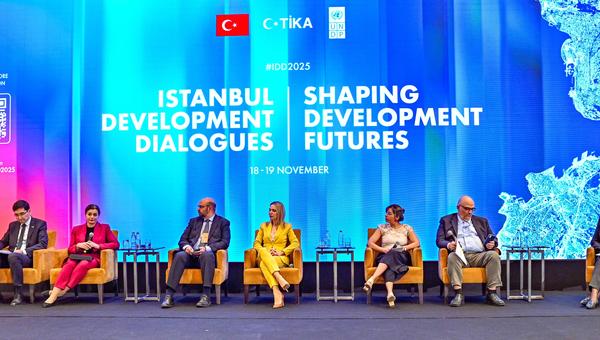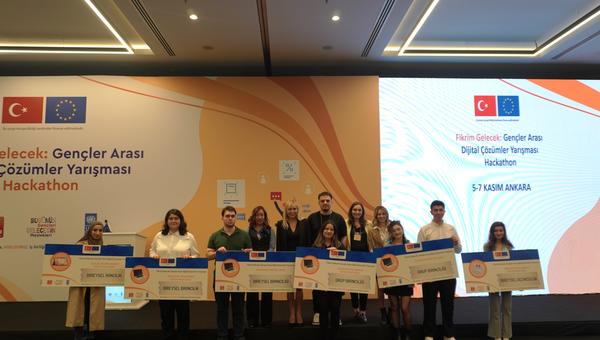Applied SME Capability Center - Model Factory Phase II Project
What is the project about?
The "Applied SME Capability Center - Model Factory Phase 2 Project" is designed to enhance the productivity and capabilities of Small and Medium Enterprises (SMEs) across Türkiye. Building on the success of its first phase, this project aims to further develop and expand the network of model factories (MFs). These centers are dedicated to providing SMEs with practical training and consultancy in lean manufacturing and digital transformation, thereby equipping them with the necessary tools and knowledge to thrive in a rapidly evolving industrial landscape.
The project is a joint initiative of the United Nations Development Programme (UNDP) and the Turkish Ministry of Industry and Technology (MoIT). It is financed by both national and international stakeholders, reflecting a significant commitment to boosting the Turkish manufacturing sector's competitiveness and sustainability.
What has been the situation?
Prior to the initiation of the first phase of the model factory project, the Turkish manufacturing sector was characterized by moderate productivity levels and a slow adoption of advanced manufacturing technologies. This was further complicated by structural challenges and the need for a skilled workforce capable of navigating the nuances of modern industrial production.
The first phase of the model factory project addressed these challenges by establishing several competency centers across the country. These centers have successfully provided training and support to hundreds of SMEs, enhancing their operational efficiencies and technological capabilities. The positive outcomes from these interventions laid a robust foundation for the second phase of the project.
What is our mission?
The overarching mission of the second phase is to consolidate the gains from the initial phase and scale up the initiative to cover more regions and industries within Türkiye. The Model Factory Phase 2 project seeks to:
- Enhance the infrastructure and training capabilities of existing model factories,
- Establish additional model factories in strategically chosen provinces to ensure wider geographical coverage,
- Strengthen the institutional capabilities of the Turkish Ministry of Industry and Technology, enabling it to provide more effective oversight and strategic guidance to the expanding network of model factories,
This expanded mission is designed to support Türkiye’s broader industrial strategy, which includes increasing sectoral productivity, reducing technological dependencies, and improving international competitiveness.
How are we doing this?
Output 1: Enhancing Capacities of Existing Model Factories
- Development of Coordination and Cooperation: Strengthening the network among existing factories to foster a unified approach to industrial training.
- Performance Monitoring and Evaluation System (PMES): Implementing robust monitoring tools to ensure the effectiveness of training programs and the adoption of best practices across all model factories.
- Capacity Development: Conducting advanced training modules focusing on digital and green transformations to ensure that SMEs are well-equipped to meet the challenges of modern manufacturing environments.
Output 2: Establishing New Model Factories in Target Provinces
- Feasibility Studies and Legal Cooperation: Identifying new provinces for expansion, such as Eskişehir, Denizli, Samsun, Kocaeli, Malatya, and Trabzon, and establishing the necessary legal frameworks for new model factories.
- Operationalization of New Model Factories: Setting up the infrastructure and training programs essential for the new factories to begin operations efficiently and effectively.
Output 3: Improving the Capacity of MoIT and Related Stakeholders
- Comprehensive Capacity Building: Developing and implementing a series of training and development programs for ministry staff to enhance their ability to manage and oversee the model factory network.
- Knowledge Transfer: Organizing national and international study visits to facilitate the exchange of ideas and best practices in industrial training and management.
How will Türkiye benefit?
The expansion and enhancement of the model factory network will bring multifaceted benefits to Türkiye. By increasing the productivity of SMEs, it will directly contribute to Türkiye’s GDP and job market, particularly in high-tech and sustainable manufacturing sectors, thus facilitating economic growth and job creation.
The initiative will foster a culture of innovation, enabling SMEs operating in Türkiye to adopt advanced manufacturing technologies and practices, thereby equipping them to compete in international markets and facilitating their inclusion in global competition.
By expanding the reach of model factories to more regions and sectors, the project will broadly distribute the benefits of advanced manufacturing capabilities, supporting regional development and reducing economic disparities. In other words, the successful implementation of this project will transform Türkiye’s manufacturing industry, making it more dynamic, competitive, and better prepared to meet the challenges of the 21st century.

 Locations
Locations





